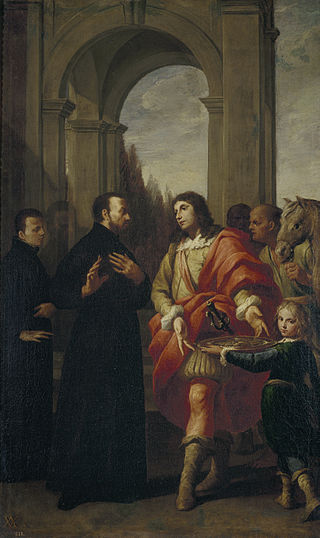Related Research Articles

Dominic, Dominik or Dominick is a male given name common among Roman Catholics and other Latin-Romans. Originally from the late Roman-Italic name "Dominicus", its translation means "Lordly", "Belonging to God" or "of the Master".

Kensico Cemetery, located in Valhalla, Westchester County, New York was founded in 1889, when many New York City cemeteries were becoming full, and rural cemeteries were being created near the railroads that served the city. Initially 250 acres (1.0 km2), it was expanded to 600 acres (2.4 km2) in 1905, but reduced to 461 acres (1.87 km2) in 1912, when a portion was sold to the neighboring Gate of Heaven Cemetery.
Dino is a male given name.
Donald is a masculine given name derived from the Gaelic name Dòmhnall. This comes from the Proto-Celtic *Dumno-ualos. The final -d in Donald is partly derived from a misinterpretation of the Gaelic pronunciation by English speakers, and partly associated with the spelling of similar-sounding Germanic names, such as Ronald. A short form of Donald is Don. Pet forms of Donald include Donnie and Donny. The feminine given name Donella is derived from Donald.

Gaetano is an Italian masculine given name. It is also used as a surname. It is derived from the Latin Caietanus, meaning "from Caieta". The given name has been in use in Italy since medieval period, although it also remained in use as a byname indicating people from Gaeta, as in Thomas Cajetan or Gaetanus (1469–1534). The modern given name can be traced to Saint Gaetano dei Conti di Tiene (1480–1547) who was canonized in 1671. Other variants of the name exist in other Romance languages, the French form of the name is Gaëtan, Gaétan, the Portuguese form is Caetano, and the Spanish form is Cayetano. The feminine form is Gaetana.
Allen is a Celtic surname, originating in Ireland, and common in Scotland, Wales and England. It is a variation of the surname MacAllen and may be derived from two separate sources: Ailin, in Irish and Scottish Gaelic, means both "little rock" and "harmony", or it may also be derived from the Celtic Aluinn, which means "handsome". Variant spellings include Alan, Allan, etc. The noble family of this surname, from which a branch went to Portugal, is descended of one Alanus de Buckenhall.
Lawrence is an English, Scottish and Irish surname. It is derived from Middle English or old French given name Laurence; itself derived from Latin Laurentius. The Oxford dictionaryof family names of Britain lists Laurence and McLaren as variants.
Leon is a first name of Greek origin, meaning "lion". It gave rise to similar names in other languages, including the Latin Leo, French Lyon or Léon, Irish Leon, Spanish León, Levon Լեվոն Armenian or Georgian Levan / ლევან.
Stevens as an English-language surname was brought to England after the Norman Conquest and means 'son of Steven'. This surname may refer to:
Warren is a common English and Irish surname and a masculine given name derived from the Norman family "de Warenne", a reference to a place called Varenne, a hamlet near Arques-la-Bataille, along the river Varenne in Normandy. The river name is thought to be derived from the continental Old Celtic Var- / Ver- "water, river", with a Germanic influence on the initial V- > W- after Warinna, from the Proto-Germanic war-, meaning "to protect or defend".

Eugene is a common male given name that comes from the Greek εὐγενής (eugenēs), "noble", literally "well-born", from εὖ (eu), "well" and γένος (genos), "race, stock, kin". Gene is a common shortened form. The feminine variant is Eugenia or Eugenie.
The surname Finn has several origins. In some cases it is derived from the Irish Ó Finn, meaning "descendant of Fionn"; the byname means "white" or "fair-haired". In other cases it is derived from the Old Norse Finnr, a personal name sometimes derived from a byname, or else from compound names beginning with this word element. In other cases Finn is a German surname derived from an ethnic name referring to people from Finland. Notable people sharing the surname are listed below.
Luigi is a masculine Italian given name. It is the Italian form of the German name Ludwig, through the Latinization Ludovicus, corresponding to the French name Louis and its anglicized variant Lewis.
Peters is a patronymic surname of Low German, Dutch, and English origin. It can also be an English translation of Gaelic Mac Pheadair or an Americanized form of cognate surnames like Peeters or Pieters.
Rex is a male given name, short for Rexford or Reginald, derived from the Latin word rex, meaning "king". This is the etymological root word for king in several languages.
The name Emil, Emile, or Émile is a male given name meaning rival, deriving from the Latin Aemilius of the gens Aemilia. A related female given name is Emily.
Forest is both a French surname and a given name. Notable people with the name include:
References
- ↑ "Deforest name Meaning and Origin". babys.name. Retrieved 2023-03-07.